Lest we ever forget it for a moment, Mia Isaac is a tour de force.
She has this innate ability to pull you in the second she appears on screen, and that’s largely why following Covey’s journey during the flashbacks is inarguably the series at its strongest and best.
As a result, Black Cake Season 1 Episode 7 was one of the series’ best installments, as it mirrored the Black Cake series premiere in centering young Covey again and pushing the present-day characters to the fringes as needed.
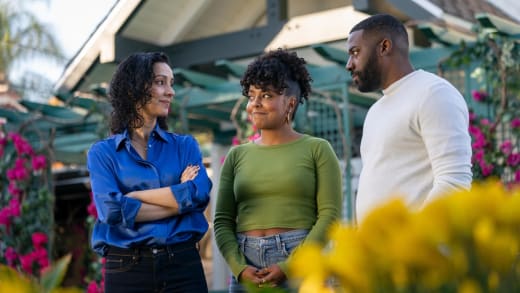
It also marked closure regarding the audio tapes and Covey/Eleanor Bennett telling her children her story.
She’s gotten her life story out. With all of its twists, turns, complications, and secrets of her choice, she places the ball in her children’s court to do with that information what they desire.
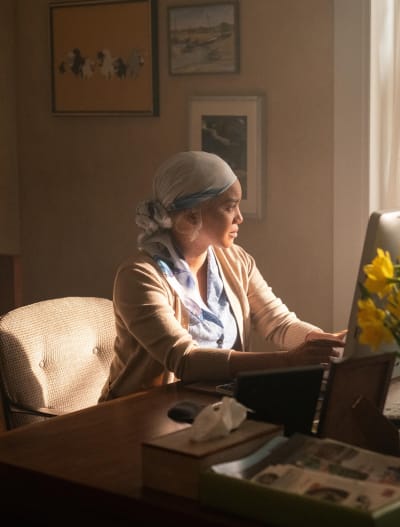
What’s promising about her final message to them is that it at least implies that she had some knowledge of Bunny, or else she wouldn’t suggest her kids seek out her former best friend for more answers, no?
It would be lovely if we learned that somehow the two women managed to reconnect, however briefly, and they got to exchange some form of something in some capacity.
Eleanor teases that certain things are best left buried. She’s speaking about Little Man’s death and the circumstances surrounding whoever murdered him.
The hour heavily implies what many have suspected: Pearl was behind it. We saw her getting the ingredients ready for the black cake.
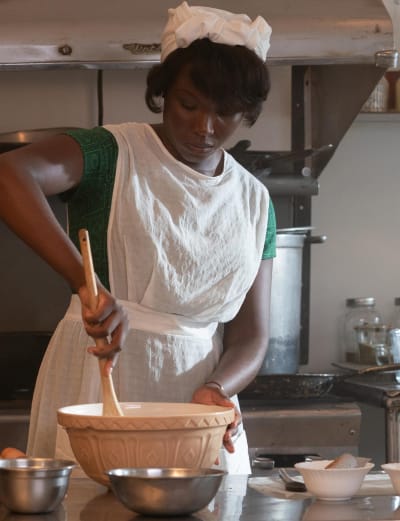
The particular timing of her return to the kitchen to finish up after her conversation with Covey speaks volumes. But there are also a few other suspects when it comes to who is behind the poisoning.
Lin Lyncook claimed he wasn’t behind it at all, but we also know Bunny and how far she was willing to go to help Covey, and there’s still a chance that Gibbs was behind it as well, based on Lin’s statements.
It’s a murder mystery that lingers throughout the series, but once we get wrapped up in Covey’s journey, one can’t say that the answer is of much concern.
Ultimately, I didn’t care about the circumstances surrounding why Covey embarked on such a remarkable, tragic, complex journey. I only cared about what happened to her along the way.
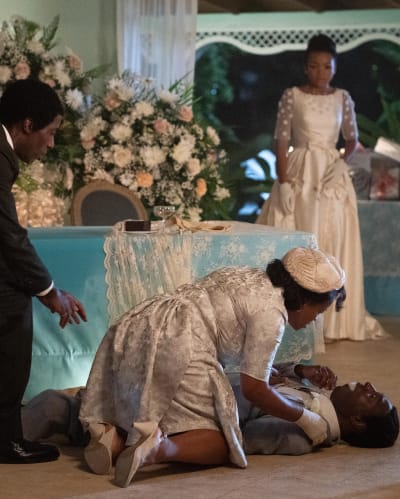
Who was behind Little Man’s death never felt like a pressing matter, but if that’s what it’ll take to bring the siblings perhaps together and prompt them to dig more into Eleanor’s past, then so be it.
We need at least one final adventure, or the beginning of one, with Covey’s children to make this series come full circle and clench what drives him about family, connection, and identity.
B and B, I don’t know how you will feel after hearing everything I’ve had to say. You may be upset. You may be asking yourselves if you could ever really know who I am, and this is what I need you to hear. You have always known who I am. Who I am is your mother.
Eleanor
Mabel had the difficult task of listening to how she came to be, and it wasn’t an easy tale nor a pretty one. It undoubtedly left her with so many conflicted emotions about her life, what she knew, and even the parents who raised her.
It’s because Mabel comes to this as an outsider with nonexistent knowledge recently that her part of the story has been so compelling.
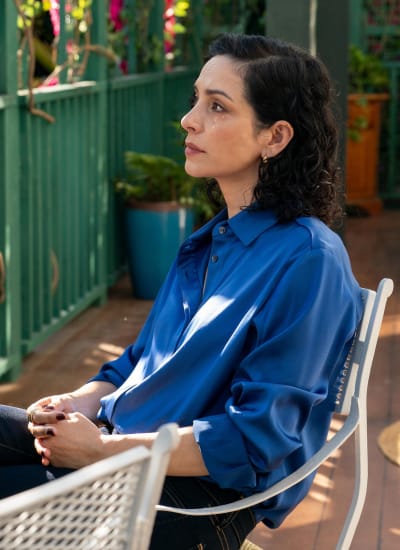
It’s also ironic how parallels are drawn, and the connection between her and Covey/Eleanor is so intriguing as a concept.
In many ways, it feels all the more fitting that Eleanor’s story is wrapped with Mabel.
One can only imagine what it was like for Mabel to learn that she was a product of violence inflicted and realize that Covey had a long journey before she could process that trauma and the result of it and view Mabel as something other than the remnants of something unspeakable.
The hour doesn’t shy away from this in the least. Birth Mother goes all in with its deep exploration of the complexities of motherhood on various levels via Covey and Irene.
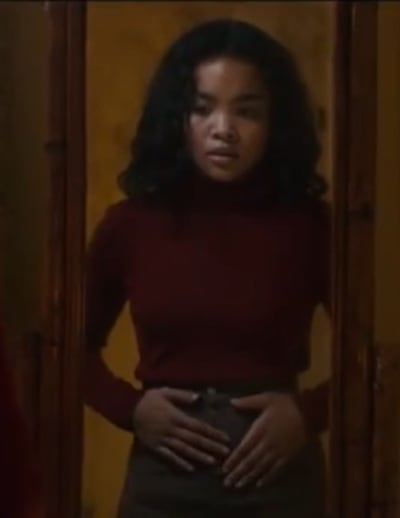
The series is often at its best when it thoughtfully delves into some of these issues instead of forcefully. It leans toward subtly showing and trusting the audience to comprehend what they’re saying rather than spoonfeeding and handholding us through things.
Covey’s entire process of coming to grips with her pregnancy, becoming detached and dissociating from most of her pregnancy, and then experiencing that rush of unconditional love for this life she was growing inside of her felt so raw and organic.
Related: Black Cake Review Season 1 Episode 6 Review: Ma
By the time Covey was on her knees sobbing for her baby long after little Mabel and her parents were no more than a dot in the distance, your heart shattered for her.
Motherhood is glamorized. Society speaks of it as if it’s the ultimate thing a woman can be and should take to it instantly, long for it, and come naturally to all of these things.
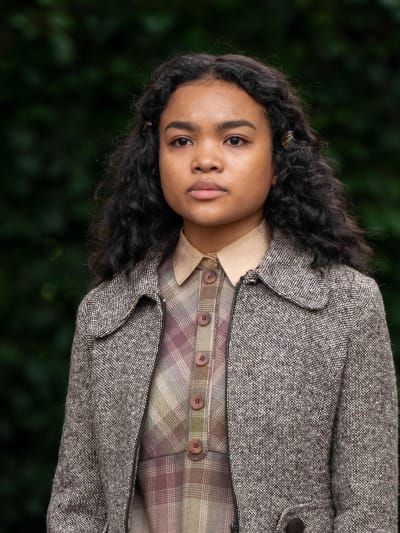
It’s a specific idea of what it means to be a “fit” mother versus not, and that was especially said during that time.
One of the most quietly profound moments was when Covey noted that all of these unwed pregnant girls in the home had no idea about what labor and more entailed.
Anything about women, their bodies, and more were things that society simply didn’t discuss or place value in beyond the life that they were carrying.
Sadly, as we’ve seen in recent years, that idealogy remains.

The young women cooked and cleaned their room and board, but it wasn’t as if the nuns were teaching them about what was happening to their bodies and what would take place when the baby was coming.
They treated these young women as nothing more than walking incubators for the children they eagerly placed into the hands of those who desired them.
Related: Black Cake Season 1 Episode 5 Review: Mother
It left you sitting there, incredulous as to how many of these young women probably didn’t even realize the full extent of what was taking place during sex and the actual conception of the children they were carrying in the first place.
Because, like the process of pregnancy, labor, and delivery, a woman’s sexuality was simply not something discussed, deemed worthy of learning about and exploring, or worth having valuable intel about, which is disheartening, among many other things.

The hour is just subtle enough to touch on all these little things, letting the full breadth of the times, the thought processes, the microaggressions, and all that women like Covey faced at the time by having them effortlessly weaved into the story.
And it’s all in the little details, like Covey walking past a “No Dogs, No Irish, No Blacks” sign as she heads to London’s version of Chinatown, desperate to settle in and disappear while she thinks.
Young ladies these days are so liberated it’s no wonder when these types of predicaments come about.
Doctor
It’s also in the dialogue, such as how indifferently the nameless doctor spoke about Covey’s pregnancy and the casual, misogynistic victim blaming he muttered without a second thought, essentially blaming her for her boss raping her because women are too “liberated.”
We catch these little moments and their meaning in so many blink-and-you-miss scenes, such as Sister Madeline’s reaction when she learned that Covey’s child was biracial or the general regard for unwed mothers and what they could be regarding their children.
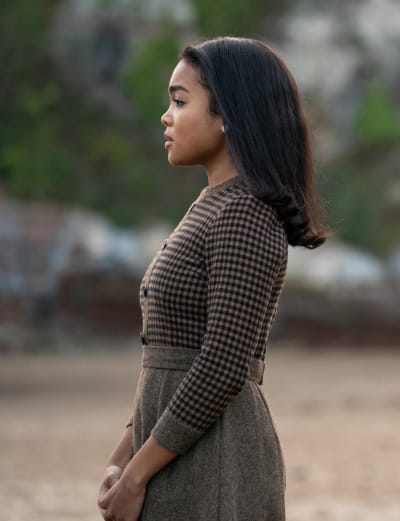
It was also notable how Covey had gradually shifted in appearance; her natural hair featured more prominently again, and there was an uncanny way in which you could envision how this woman would transition into the Eleanor that we saw in the recent past.
Black Cake’s casting is impressive; these are the little moments when you can truly appreciate the skill level.
It also translates to how Mabel’s more natural waves make a steady, consistent appearance amid all of this.
With Black Cake, they do so well with some of the secondary characters. It’s incredible how sometimes they’re some of the most intriguing ones who add so much to the story, and other times they fall so short.

While not a character who elicits the level of attachment as Bunny or even Elly, Irene is still an impactful character within the hour.
Namely, it was heartrending to see her so hopeful about starting a life together with her boyfriend, despite signing away rights to her child at this home, only to become utterly despondent when her child was born.
They’ve been praying for a baby for years, and they’ve agreed to keep Mathilda as her middle name at my request.
Sister Madeline
We didn’t need someone to outline her postpartum. They allowed us to make the natural conclusion from her behavior.
It was upsetting to see this poor young woman in such visible anguish and pain without the knowledge, the tools, or the concern from anyone remotely capable of helping her.
She went from loving the idea of this child she was having to not even wanting to name her — the baby becoming nothing more than a number.

Her irritation with the breastfeeding and desire to get back to cleaning was telling, but nothing more than when Covey caught her unlatching the baby’s mouth from her breast and lying about the infant’s reluctance to feed to get away from it all.
Her final scene with Covey was upsetting.
She was far from the same girl who befriended Covey when she arrived, and to know that she went back home to the same parents who sent her away, where she would probably spend the rest of her days pretending as if she never had a child– it’s unfathomable.
Related: Found Review: Missing While Scamming
The hour does a lot of heavy lifting in giving a realistic and unflinching look at labor, birth, and motherhood– the brutality of the process physically, emotionally, and mentally.
If ever there was a reminder of how it’s the closest one comes to death and how deeply traumatizing to the body and mind it can be, we got that here.

It was also a great hour to give us those flashbacks to Mathilda, especially since it’s through Covey’s lingering connection to her mother that she came to name her child after her.
This cycle of womanhood was poignant. The scenes of Mathilda teaching Covey how to breathe during her swimming lessons, juxtaposed with Covey breathing through her labor and delivery, were beautifully done.
Mathilda and what she represented as a mother got recognition as Covey/Eleanor realized some of what her mother must’ve felt late in life.
On the surface, it seems unfathomable that a woman can just abandon her child with an irresponsible man and never come back.
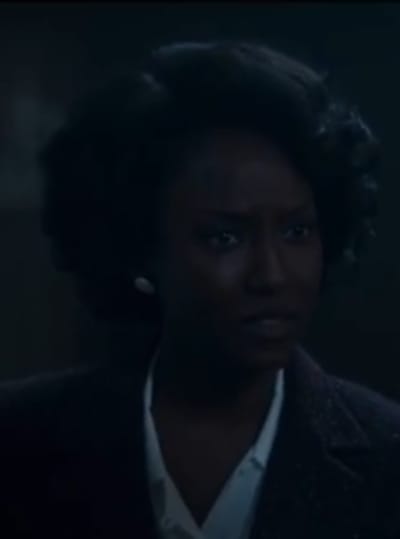
The question of why Mathilda didn’t take Covey with her lingers heavily over the series, but then, to ponder that, one must also come to grips with the many factors that come into play.
We’ve seen through Covey’s journey that it’s not as if a woman, especially a woman of color, has much access, rights, or privileges.
Related: How Will Trent Could Incorporate Key Points From the Book Series
When you consider in the States, women couldn’t even legally open their own bank account alone until 1974, it puts some things into perspective about how difficult it was for a woman in the 50s and 60s couldn’t just take her kid and leave.
It’s that same sexism and inequity that had Covey essentially being sold to Little Man in the first place with little choice.
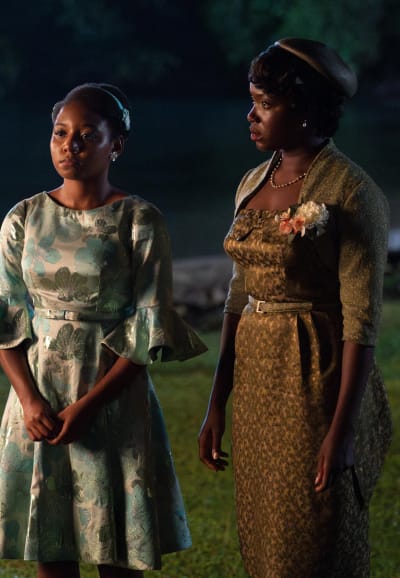
It’s why Pearl and Bunny, like Pearl did for Mathilda, have to work secretly when helping Covey escape. It’s fascinating how Covey knew so little about her mother but managed to follow a similar path anyway.
And through her experiences, she felt closer to her mother than ever.
Before I met you, my first born, I was afraid that you would be a reminder of that horrible thing that happened to me then all of a sudden, my past didn’t matter. All of a sudden, you were my future, my everything.
Eleanor
The tragedy is that she never learned what happened to Mathilda. Now that we know Mathilda had every intention of coming back for Covey, one can only guess that the worst happened to her to prevent that from happening.
Black Cake does well in building a full story around the complexities of women, which is part of the series’ appeal. It doesn’t manage to pull this off with all of its female characters, but we’ve seen this with Covey’s journey.
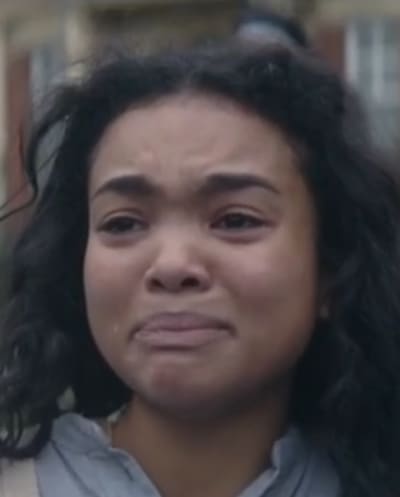
Black Cake also managed to do this with Mathilda now that they’ve filled in some gaps. With one more installment, I’m curious how they wrap up this series!
Tea and Cake:
During Black Cake Season 1 Episode 1, Eleanor said she wanted B and B to hear her story and then tell everyone who she was; I’m curious to see in what capacity they do that.
Can we anticipate Covey’s kids tracking down Bunny all these years and getting to tie a bow on their mother’s story?
If you were Mabel, could you ever look at your parents the same way again? Not only did they lie to her for her entire life about her adoption and identity, but they clearly saw Covey didn’t want to give Mabel up and fled that home and never looked back.
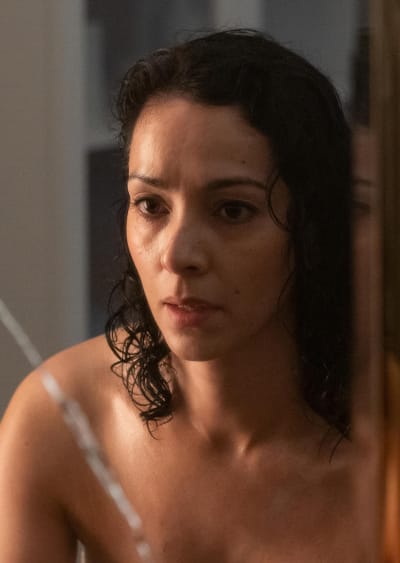
It’s genuinely refreshing how this series tackles depression and suicide ideation because it’s something that is still difficult to discuss or navigate in the Black community. We’ve seen Covey willing to give up living a few times throughout the series.
If ever there was a way of capturing the distinction between pro-life and pro-birth, it’s how the nuns cast Covey aside, broken, traumatized, and emotionally unstable the second they no longer needed her for the baby.
Chipo Chung gives me chills in those voiceovers. When Eleanor states that her B and B have always known who she was, it hits you right in the feels.
Over to you, Black Cake Fanatics.
How did you feel about this penultimate episode of the series? What do you hope to see in the finale? Sound off below!
Black Cake airs on Wednesdays on Hulu.
Edit Delete
Jasmine Blu is a senior staff writer for TV Fanatic. She is an insomniac who spends late nights and early mornings binge-watching way too many shows and binge-drinking way too much tea. Her eclectic taste makes her an unpredictable viewer with an appreciation for complex characters, diverse representation, dynamic duos, compelling stories, and guilty pleasures. You’ll definitely find her obsessively live-tweeting, waxing poetic, and chatting up fellow Fanatics and readers. Follow her on X.


.png)
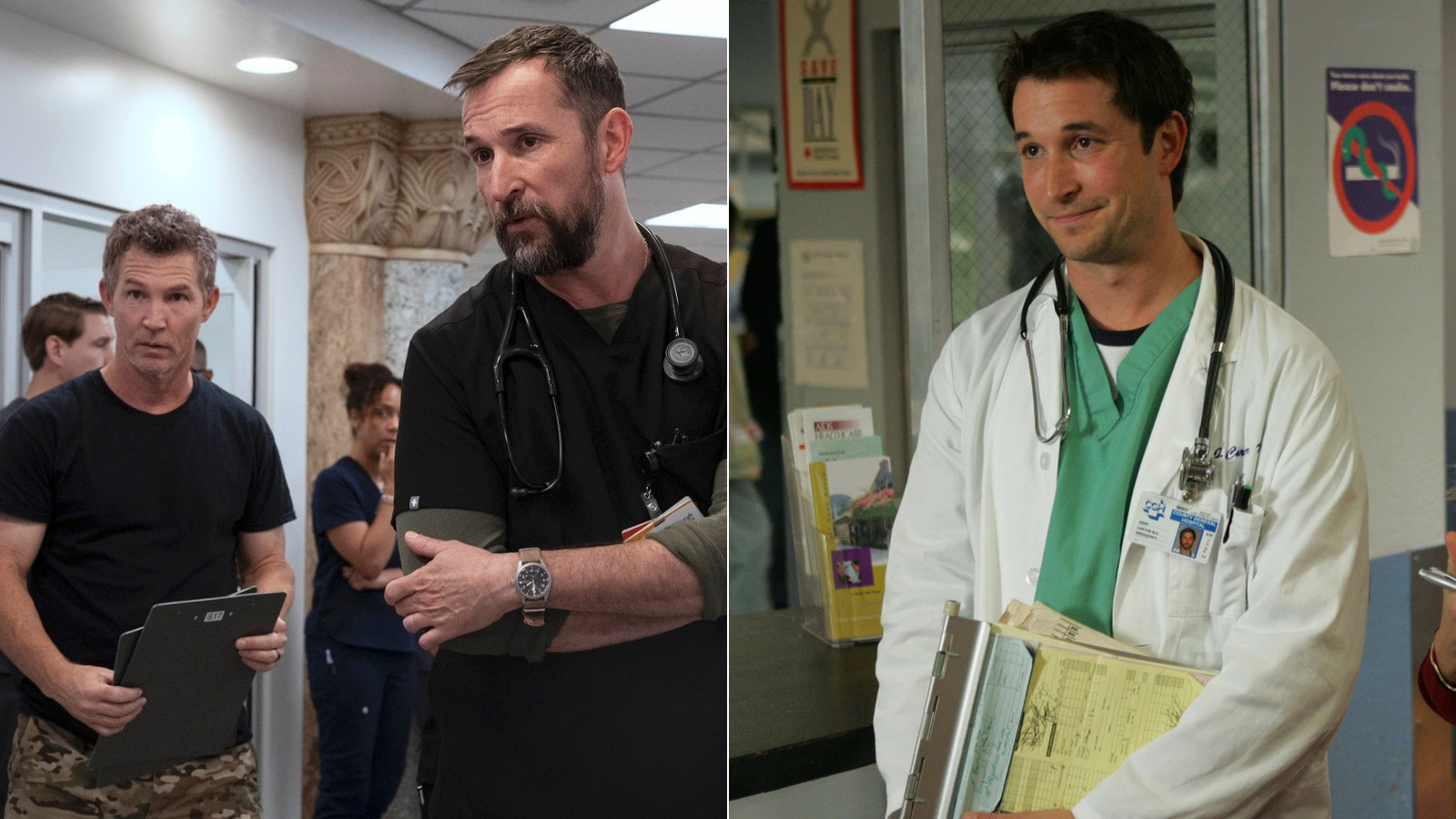


.png)
